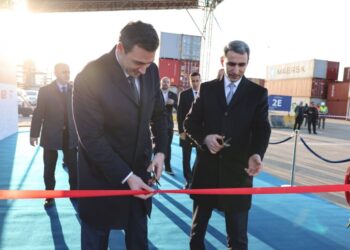North Korea and Russia look to be forging deeper military and political ties as Moscow’s appetite for weaponry grows amid the ongoing war in Ukraine.
A White House official said Monday that North Korean leader Kim Jong Un plans to travel to Russia to meet with Russian President Vladimir Putin this month and that arms negotiations between the countries “are actively advancing.”
The New York Times also reported Monday that Kim Yong Un would likely travel from Pyongyang to Russia’s Pacific Coast city of Vladivostok in an armored train, citing unnamed US and allied sources.
Meanwhile, talks between Putin and his Turkish counterpart aimed at reviving a grain export deal with Ukraine ended in failure Monday, with Putin saying the agreement wouldn’t be revived unless obstacles to Russian exports were removed.
“I would like to reaffirm our principled position: we will be ready to consider the possibility of reviving the ‘grain deal’ … and we will do this immediately — as soon as all the agreements on lifting restrictions recorded in it are fully implemented for the export of Russian agricultural products,” Putin said following the talks in Sochi.
Return of American nuclear weapons to the UK will be seen as ‘escalatory step,’ Russian official says
The return of American nuclear weapons to the UK will be perceived by Moscow as an “escalatory step,” according to Russian Foreign Ministry spokesperson Maria Zakharova.
There is increasing evidence to suggest that the US may be looking to house American nuclear weapons in the U.K., according to the Federation of American Scientists, who listed a location around 100 kilometers away from the capital, London, as the planned dormitory.
Atomic bombs had been stored at the Lakenheath Royal Air Force base from 1954, before they were removed in 2008, according to the Federation.
Zakharova described the move as “leading exactly in the opposite direction from the solution of the urgent task of withdrawing all US nuclear weapons from European countries, where they are deployed in the framework of the so-called NATO joint nuclear missions.”
Moscow also regards the West’s plans to expand weapons production in Ukraine as further confirmation of its involvement in the war between Russian and Ukraine. Zakharova said the Kremlin “paid attention” to announcements by the likes of Rheinmetall and subsidiaries of BAE Systems to assist in maintaining equipment for Ukraine’s armed forces.
“We consider such intentions as another confirmation of the Western ruling circles and military-industrial complex’s direct involvement in the conflict and support for the criminal Kiev regime,” she added.
Top Russian general resurfaces after Prigozhin mutiny, media reports
A photo has emerged online that appears to show Russian General Sergei Surovikin, a top military figure who was regarded as an ally of Yevgeny Prigozhin, alive and in public.
Surovikin had not been since since Prigozhin’s failed mutiny in June, prompting speculation that he had been detained for his links to the ill-fated mercenary boss. Prigozhin, the head of the mercenary Wagner Group, died last month in a plane crash.
The general’s last public appearance was on the day of the rebellion itself as he called on Prigozhin to turn back as he and a band of Wagner mercenaries headed to Moscow. The rebellion was seen as the culmination of a long-running dispute between Prigozhin and Russia’s defense ministry.
On Monday, however, a photo was posted on Telegram by Russian media personality Ksenia Sobchak purportedly of Surovikin and his wife.
“General Sergei Surovikin is out. Alive, healthy, at home, with his family, in Moscow. Photo taken today,” Sobchak wrote in a caption on the picture on Telegram.
The general was reportedly arrested in June and then dismissed as the head of Russia’s Aerospace Forces in August, according to the Moscow Times.
Meanwhile, the New York Times reported that Surovikin appeared to have been freed but cited unnamed US officials as saying it was not clear if his movement was restricted.
The Kremlin and Russian defense ministry have refused to answer reporters’ questions on the whereabouts and role of Surovikin now.
Surovikin had been appointed to lead Russia’s armed forces in Ukraine last October, and was credited for spearheading the building of deep lines of Russian defenses on occupied territory ahead of Ukraine’s counteroffensive. The defensive lines have proved a hard obstacle for Ukraine to overcome.
Surovikin was replaced by Putin loyalist General Valery Gerasimov in January 2023, with speculation that he was replaced because he had become too powerful.
Compiled by Ana Dumbadze














